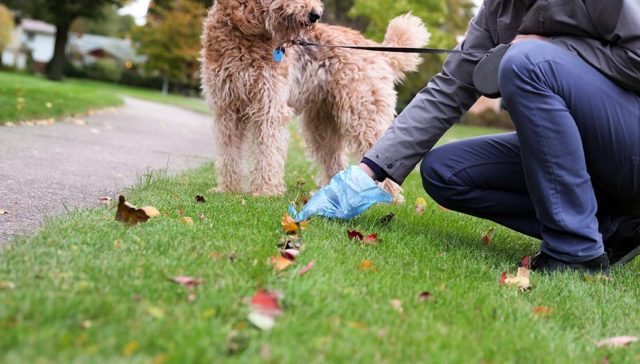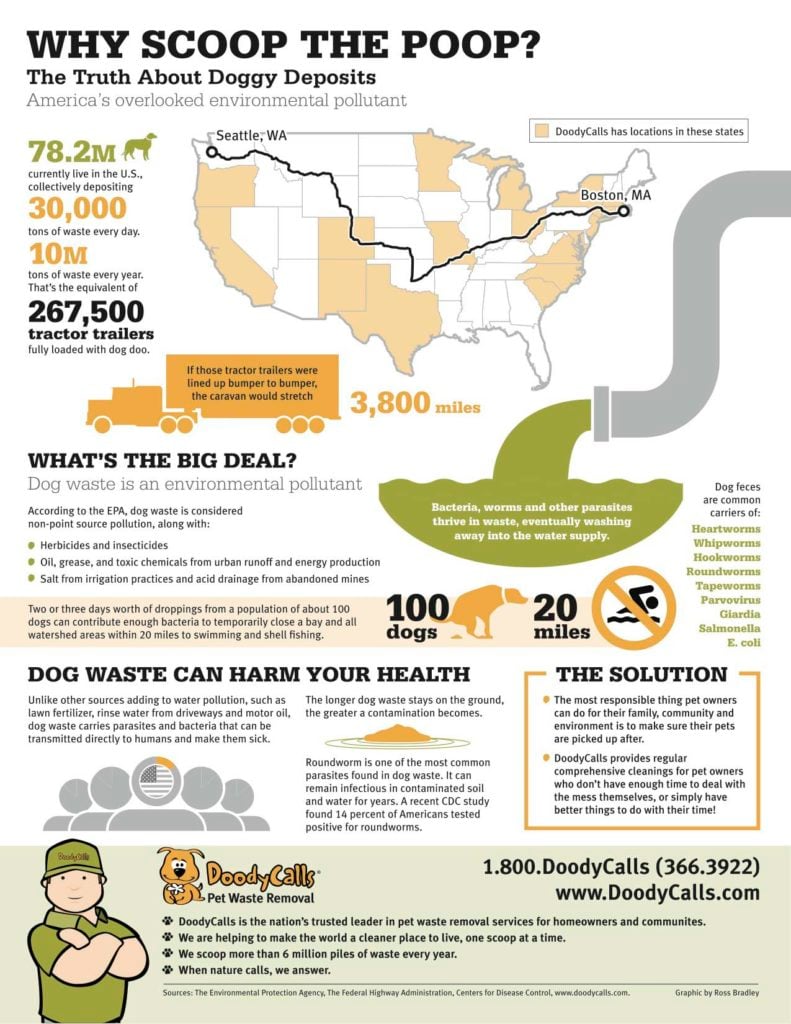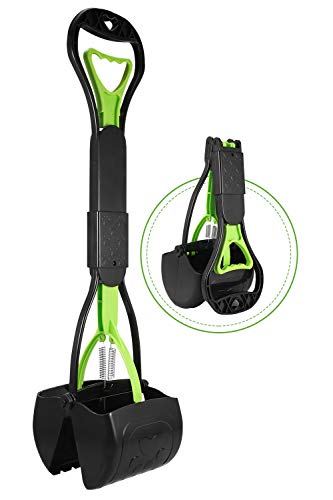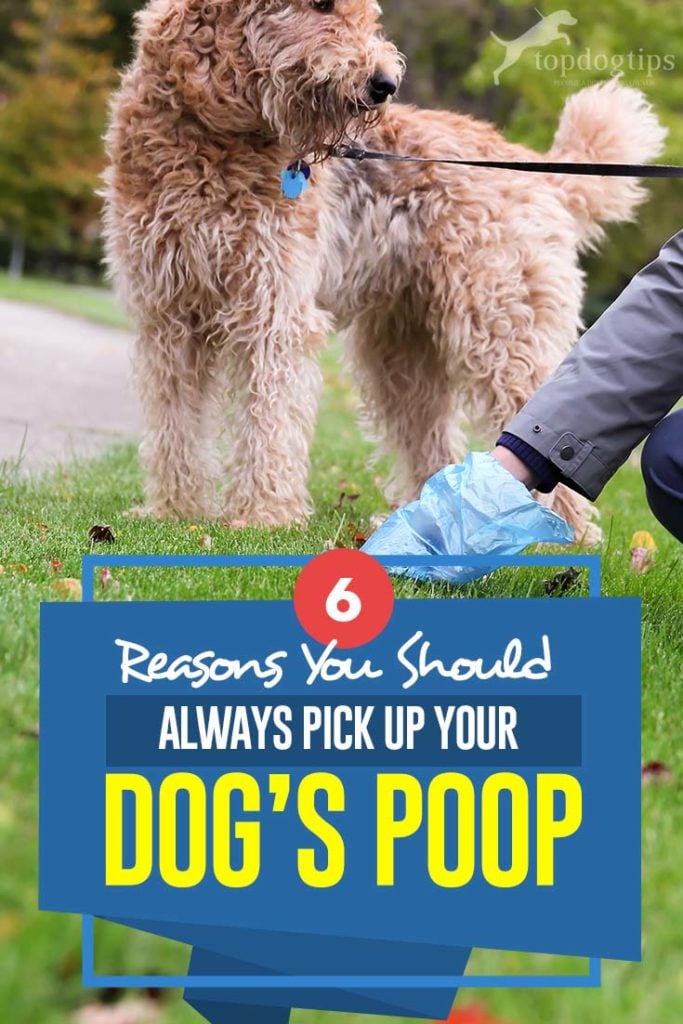
Table of Contents
For some dog owners, it may sometimes seem like an imposition to pick up dog poop, but it’s our responsibility. And the reason it's an important responsibility is because picking up after your dog is not only about maintaining a sanitary community – it’s about much more than just that. Here are some of the reasons why it's crucial to pick up your dog's waste.
Before getting to the important reasons, consider the fact that there are 23 million coliform bacteria per gram of a dog’s poop. Also, some of the more common bacteria, pests, and contaminants found in your dog’s poop can remain in the soil for years.
Finally, wastewater facilities do a pretty good job of cleaning our water, but they are unable to filter all the bacteria from dog poop, so a lot of them stay there, making this a public health problem.
1. Maintaining a Sanitary Community and Abiding Laws
It may not be the only reason why you should always pick up after your dog, but it’s a pretty good one all the same. People don’t buy houses if there is an abundance of dog poop in the yard, and pet waste is never added to the value of a property.
In many states and cities, like Austin, TX, for example, city ordinances state that it is against the law to leave animal waste on the ground. Many will also have a “Report Pet Waste” number that someone can call if they see you not picking up after your dog.
Don’t force your neighbors to live in an area that’s unsanitary because you can’t be bothered to pick up poo, it’s just inconsiderate. In apartment communities, it can often be a lease violation when a resident doesn't pick up poop after their dog, and many of your neighbors will be quick to report such a violation.
2. Dog Poop is NOT Fertilizer
We’ve heard people use this excuse before when they try to walk away from a pile of dog poop on a public grassy area – “it's good for the plants.” No, it's not good for the plants, and dog poop does not work as a fertilizer.
In fact, animal waste does the opposite – it damages grass due to high levels of acidity.
It's time we stop using excuses founded on advice based on assumptions made from unrelated information. Yes, cow manure is great for the yard; no, dog poop isn’t. There are two different types of feces. Instead, pick up an environmentally friendly type of dog poop bag and get that pet waste out of the grass and into a bin.
3. Dog Poop is a Pollutant
EPA classifies dog poop as a pollutant. In the same category as more obvious and infamous pollutants such as oil spills, dog waste is considered a pollutant because of the presence of nutrients and pathogens (PDF), which leach into soil and water, and thus impact natural plant growth, wildlife, and human health.
Picking up your dog’s poop is necessary because otherwise, it could wind up causing an overgrowth of algae or causing you and your pets to become really ill.
4. It Contains Pathogens That Are Harmful to Your Health
While we’re talking about dog waste being a pollutant, let’s consider the pathogens that can be present in your animal's feces that are harmful not only to the environment but to human health too:
Campylobacter – Humans infected with Campylobacter develop symptoms within 2-5 days of exposure. These symptoms include diarrhea, abdominal pain, cramping, and fever. In at-risk populations, Campylobacter can cause death.
Hookworm – Humans infected with zoonotic hookworms develop symptoms, which include a linear skin rash where the worm larva enters the skin, itching, and pain. Zoonotic hookworms usually survive between 5 and 6 weeks in the human body since we are not the ideal hosts, but those weeks will be miserable, particularly if you develop an intestinal infection.
Roundworm – Roundworm infection is responsible for Toxocariasis in humans. Humans (mostly children) can develop one of two types of roundworm infection upon exposure.
Ocular larva migrans are when the roundworm larvae enter the retina and cause scarring and inflammation in the eye. This type of infection can also cause blindness.
Visceral larva migrans are when the larvae enter visceral organs or major bodily systems such as the lung, liver, or central nervous system. Symptoms of this type of infection vary but can include coughing, fever, pneumonia, and an enlarged liver.
Cryptosporidiosis – A rarer parasitic disease, Cryptosporidiosis in humans can cause profuse diarrhea, abdominal pain, and cramping. Although self-limiting (2-4 days), it can be very dangerous to vulnerable populations.
Echinococcosis – Caused when food or water are contaminated by feces containing a specific type of tapeworm egg—Echinococcosis, a parasitic disease. Since Echinococcosis can infect various organs of the human body, symptoms vary and may not develop until years after the initial infection. Symptoms may only be noticed when large cysts grow in the area of infection and press against the infected organs (usually the lungs and liver).
Giardiasis – A parasitic disease, giardia in humans can last between 1 to 2 weeks and causes severe diarrhea, dehydration, abdominal cramping, nausea, vomiting, and greasy stools. Giardia can be much more dangerous in at-risk populations, and children who have severe giardiasis have been seen to exhibit slow development, delayed mental and physical growth, and malnutrition.
Leptospirosis – A bacterial disease, Leptospirosis may not display any symptoms in humans at all, or it could present with flu-like symptoms that begin to show between 2 – 7 days after exposure. While symptoms of Leptospirosis can resolve without medical intervention, they can recur later and cause severe illness.
5. Feces Pass Parasites and Pathogens to Other Dogs
While not all parasites and pathogens in dog poop are zoonotic (meaning that they can be contracted by humans), they can be contracted by other dogs.
Even if your pooch shows no symptoms of a parasitic infection or illness, they could still be carrying and shedding it through their poop.
This means that other dogs that approach your dog’s waste when you don’t pick up after them can contract:
- Whipworms
- Hookworms
- Roundworms
- Tapeworms
- Parvo
- Corona
- Giardiasis
- Salmonellosis
- Cryptosporidiosis
- Campylobacteriosis
…and that’s only naming a few of the most common diseases that could be present in animal waste.
6. Dog Poop Attracts Pests
Flies like poop, so when you don’t pick up your puppy's waste, you are leaving an open invitation for flies to drop by and lay their eggs. Not only are those flies unpleasant, but they are also an effective transmitter of diseases, including dysentery.
We should also mention here that there is a belief that dog poop attracts rats because of the presence of undigested food. This isn’t true. Nobody is really sure why, but while rats under research have been willing to eat various other animal feces, they won’t touch dog poop (and who can blame them).

What Should You Do If…
There are a handful of “what if’s” that get asked quite frequently when it comes to picking up dog poop, so here are some of the more common and fitting answers.
Q: What Should You Do If You Don’t Have a Bag to Pick Up After Your Dog?
A: This should never happen because you should always be prepared with a dog poop scooper and/or excess poop bags when you go out with your dog. For $4, you can grab a clip-on poop bag holder and keep it on your dog’s leash too.
If you do find yourself without a bag, find another dog owner and explain that you have run out of bags and ask if they have a bag that you could use (please don’t say borrow). Trust me, most of us are more than happy to share as long as it means the poop gets picked up.
If there is no one around you can ask for a bag, look in your pockets or your car to see if there is anything you might be able to use. If you can’t find anything usable, mark the area and come back with a bag to pick up after your walk.
Q: What Should You Do If You “Can’t” Pick Up After Your Dog?
A: There are two scenarios here. Firstly, the person who says that they “can’t” pick up when they actually mean that they won’t because they find it to be distasteful. Secondly, we have the person whose dog is suffering from some kind of tummy upset, and try as they might, they can’t clean up.
In the first situation – the person who simply won’t pick up – we advise reading over the first half of this article again and reconsidering the reason why they “can’t” pick up.
In the second situation – the dog with an upset tummy – do the best you can to clean up thoroughly using a couple of bags at the same time. Once you’ve done this, take a bucket of diluted bleach solution and soak the area to clean the remnants and eliminate the possibility of dangerous bacteria or parasites from surviving. If you’re not at home or close to home, we recommend picking up as well as you can and covering the area with dirt or stones so that at least other dogs and humans won’t step in any remnants.
Q: What Should You Do If You See Someone Else Not Picking Up After Their Dog?
A: If you see someone else not picking up after their dog, first assess the situation, and then if you feel that it’s a safe situation for you and your dog, ask them directly but politely to please pick up after their dog. If they tell you that they have no bags, offer them one.
Being direct but polite lets the person know that their unacceptable behavior has been noticed and that you are not willing to let it continue. It can be tempting to be rude, passive-aggressive, or to poke fun at the person for not picking up after their dog, but don’t. You are not trying to get into a conflict here, rather you are trying to keep your community clean, don’t make it an awkward or dangerous place while you’re doing that.
If the situation is not safe to approach the person, please don’t. Of course, we don’t want dog poop left lying on our streets, but we also don’t want you to put yourself in danger. If your community has a neighborhood watch and the person not picking up lives within your community also, bring this issue up at the next meeting. If you do not have a neighborhood watch, your city may have dog fouling laws, which will allow you to report the incident so that it can be addressed by the local council.
The Best Dog Poop Bags and Poop Scoopers
Dog poop scoopers are convenient, but not necessarily. Dog poop bags are very cheap, and the best brands will also be biodegradable and environment-friendly. So if you haven't made this a habit yet, the next time you go walk your dog, pick up some of these for an affordable price, get that pet poop in there, and just dump it into the nearest trash bin.
READ NEXT: Dog Poop Color Chart – What It All Means
Disclosure: We may earn affiliate commissions at no cost to you from the links on this page. This did not affect our assessment of products. Read more here and find full disclosure here.
Want to share this?

















